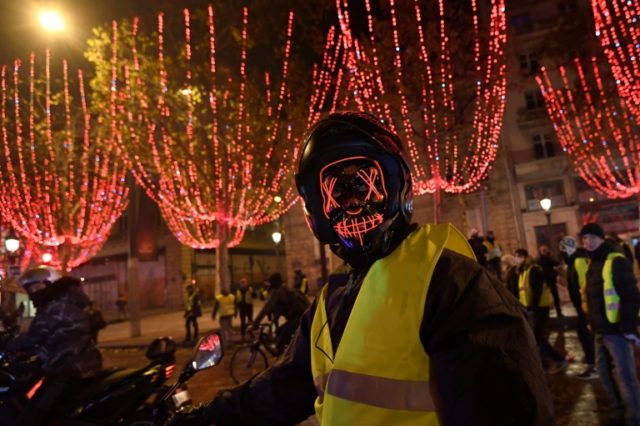Paris (AFP) – France’s angry “yellow vest” movement made headlines over the weekend when violent protests engulfed the Champs-Elysees, with tear gas and smoke from burning barricades. But who are the protesters, and what will become of them?
What are these protests about?
The movement sprang up spontaneously last month against hikes in car fuel taxes, with supporters donning the luminous safety vests carried in all French vehicles.
Backed by people in small towns and the countryside where most get around by car, it has snowballed into a wider movement against President Emmanuel Macron’s alleged bias towards the rich and big cities.
After nationwide road blockades that have left two people dead in accidents, last weekend’s violent demo in Paris symbolised a perceived gulf between urban elites and “left-behind” provincial France.
Supporters’ goals are amorphous. Many complain they barely scrape by and get scant public services in exchange for some of the highest tax bills in Europe.
Some want to reverse Macron’s tax cuts for the rich while others want more measures to help the poorest.
Many have called on the business-friendly president, a former investment banker, to resign.
What makes these protests different?
France has a long history of protest movements which have flared and waned, opposing everything from fuel taxes to gay marriage.
Analysts say what makes the yellow vests unusual is the way their movement has coalesced without leaders, organised via social media.
They also hail from diverse social and political backgrounds, though the government has blamed far-right supporters for the violence on the Champs-Elysees.
As a broad church, it stands in contrast to another spontaneous movement that spread across France in 2016, “Nuit Debout” or “Up All Night”, which was leftist.
“There are people who voted for the (far-right) National Rally, but also lots of people who don’t vote and people who voted for Macron,” said Danielle Tartakowsky, a professor of contemporary history at Paris 8 university.
Can they last?
For now, the yellow vests enjoy wide public support: a poll last week showed around 70 percent of respondents found the protests justified.
A first day of action on November 17 saw some 300,000 people turn out nationwide to man roadblocks, with sporadic protests continuing through the week.
But last Saturday only about 100,000 took part, prompting suggestions that the protests are on the wane.
“The movement could well disappear by attrition,” said Jerome Saint-Marie, head of research agency Pollingvox.
“If next Saturday there are only 50,000 people, it’s over,” he predicted.
But what began as what Saint-Marie called a “spontaneous and horizontal” movement has now indicated it is seeking to become more organised.
The yellow vests announced Monday that they are nominating an eight-person delegation to negotiate with the government.
“There is clearly a will to organise themselves. What remains to be seen is how Emmanuel Macron will respond,” said Tartakowsky.
What are the risks for Macron?
Macron came to power vowing to restore trust in politics, but the protests have brought widespread anger over his pro-business policies and perceived elitism to the streets.
With approval ratings languishing at around 30 percent, many protesters regard him as arrogant and out of touch with people living modest lives in provincial France.
His government attempted to head off the protests this month by announcing a series of measures to help poorer families pay the bills, but to no avail.
Macron is set to address the nation Tuesday, insisting he will push on with making France’s economy greener but promising to make the transition less painful for the poor.
But no major policy announcements are expected — and no reversal of the controversial fuel tax hikes, with more set to come in January.
Analysts say Macron faces a tricky balancing act in listening to people’s anger while bringing an end to road blockades that are hitting businesses in the run-up to Christmas.
Finance Minister Bruno Le Maire said large retailers had suffered a 35 percent drop in revenues on the first day of the protests, and an 18 percent drop on Saturday.
He vowed Monday that the government would restore traffic to normal so that “the country can resume its economic activity”.
“I don’t see how Emmanuel Macron can give in without major political costs,” Sainte-Marie said.
Whatever becomes of the yellow vest movement, he said: “What this movement has given birth to — this dissatisfaction and anger with government policies and with Emmanuel Macron — will not go away quickly.”

COMMENTS
Please let us know if you're having issues with commenting.